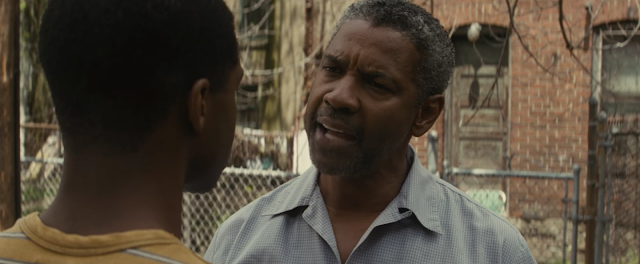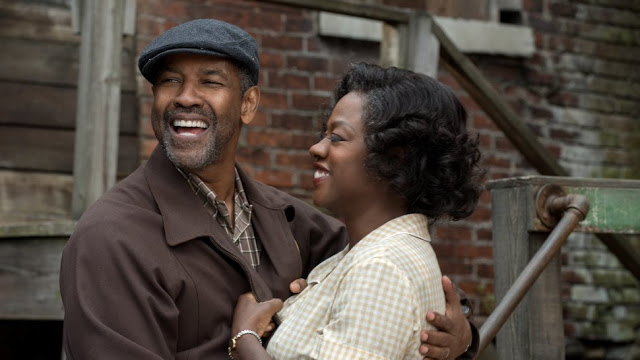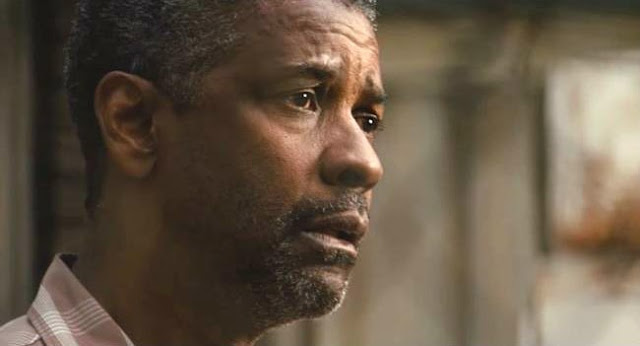Denzel Washington is a rock. That’s true of both his body of work and his actual body. Physically, he’s built like a finely chiseled piece of granite, with broad shoulders, flinty eyes, and a handsome face that occasionally breaks into a broad, beaming smile. And commercially, few movie stars are so ruggedly reliable. (How many other actors could have carried The Equalizer to $100 million, much less inspired demand for a sequel?) Washington’s consistency is often mistaken for redundancy, given that he typically portrays heroic authority figures defined by their unwavering competence; even when he played against type in Training Day, he was supremely charismatic. But in some of his best roles (Courage Under Fire, Flight), he allows tendrils of doubt and weakness to creep through the façade of proficiency and strength. In Fences, Washington delivers a towering performance that represents the apex of this duality—never before has he seemed so indomitable and, at the same time, so broken.
Which is not to say that Fences is a great movie. In a sense, it is barely a movie at all. A faithful adaptation of August Wilson’s Pulitzer-winning play, Fences’ dogmatic fidelity to its source arguably renders it a better fit for the stage than the screen. The third feature directed by Washington, it consists of a series of dialogue-heavy scenes, the bulk of which could be neatly subdivided into a handful of acts. Action is limited, as is Marcelo Zarvos’ muted score. The majority of the chatter takes place in a single house’s kitchen and backyard, with a few additional locations mixed in for variety. The camera remains relatively passive; when it does move, it does so fluidly via the Steadicam, rather than the handheld style favored by many art-house filmmakers.
This restrained approach may frustrate those who look to cinema for pleasures aesthetic as well as dramatic (not that I have anyone in mind), but on the whole, it feels correct. Rather than attempting to glamorize the proceedings with directorial flourishes, Washington has chosen to focus on Wilson’s words, and on the titanic weight of his story. (Wilson died in 2005 but receives sole credit for the screenplay; fellow playwright Tony Kushner, who touched up Wilson’s unfinished draft, is billed as a co-producer.) This means that Fences is chiefly a showcase for its actors, most of whom appeared in the 2010 Broadway revival. They all prove entirely capable, though one is decidedly more capable than the rest.
Structurally, Fences operates in the manner of a Eugene O’Neill tragedy. Things start out pleasantly enough, only for tiny interpersonal fissures to gradually splinter into yawning chasms. Washington plays Troy Maxson, the iron-willed head of a small Pittsburgh household. Troy works a tiring job as a trash collector, but in broad terms, his blue-collar life is fairly successful. He has a stable marriage with Rose (Viola Davis, wrenching when required) and a healthy rapport with his best friend and drinking buddy, Bono (Stephen McKinley Henderson, who earlier this year played Casey Affleck’s frustrated boss in Manchester by the Sea). His teenage son, Cory (The Leftovers’ Jovan Adepo), is a bright boy and promising football player who is attracting the attention of college recruiters. His relationship with Lyons (Grimm’s Russell Hornsby), his grown-up son from a previous marriage, is somewhat rocky, but not enough to prevent him from loaning Lyons the occasional tenner. You might say he seems happy.
But you wouldn’t dare say so within his earshot, lest he admonish you for your sentimentality. Sentiment is anathema to Troy, a stoic type who is nevertheless a jumble of contradictions. He is stern but can be a gregarious storyteller. He is miserly but has no difficulty spending his paycheck on liquor. And he abides by a strict code of paternity without ever appearing especially paternal.
That final incongruity is what drives Fences, which at its core is a story of fathers and sons (and husbands and wives). To be sure, it possesses additional thematic relevance. Despite being illiterate and lacking a license, Troy pushes for a promotion as a truck driver, but his limited employment ceiling suggest that he toils in a society that doubles as a caste system. He also points out that all of the current drivers are white, an injustice he finds particularly galling given his past; once a talented baseball player, he’s convinced that he failed to make the major leagues not because of his advanced age but his skin color. (In Troy’s opinion, Jackie Robinson was a middling talent.)
But Fences is primarily about neither class nor race; it’s about family. Troy’s view of the nuclear unit is decidedly traditional—a man provides. Troy does so, but any attendant emotional connection to his sons appears beyond him. This causes great grief to Cory who, in the movie’s crystallizing scene, asks his father why he doesn’t like him. Troy responds with a blistering tirade that essentially paraphrases Clint Eastwood’s memorable quote from Unforgiven: Like’s got nothing to do with it.
Hearing those words tumble from the mouth of one of American cinema’s most appealing actors generates something of a shock. Yet Washington, in a brilliant, exquisitely nimble performance, somehow embellishes his naturally likable persona while simultaneously chipping away at it. Resisting the temptation to turn Troy into a larger-than-life villain, Washington instead makes him terrifyingly life-sized, a man equal parts loyal and selfish, rigid and brittle. Troy is in many ways a hopeless figure, most of all because he has extinguished his own hopes.
Whenever Fences pits Troy against another character—a quietly loaded chat with Bono, a heartbreaking verbal brawl with Rose, that chilling lecture to Cory—it is riveting. But when three or more performers share the screen, the artificial stiffness of playwriting begins to take hold, and the limitations of Washington’s literalistic approach become more glaring. And as it plunges into its final, mournful act, Fences squanders its fascinating edginess, replacing it with more typical tragic hand-wringing. Not coincidentally, Washington spends these concluding scenes behind the camera rather than in front of it. Given that, it is perhaps easy to forgive him for allowing the urgency to leak out of his picture. As a director, he is a bit lost without his leading man. But as an actor, he provides.
Jeremy Beck is the editor-in-chief of MovieManifesto. He watches more movies and television than he probably should.



